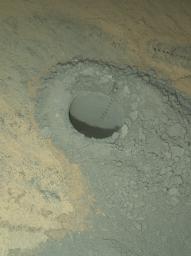NASA's Curiosity Mars rover used the Mars Hand Lens Imager (MAHLI) instrument on its robotic arm to illuminate and record this nighttime view of the sandstone rock target "Windjana." The rover had previously drilled a hole to collect sample material from the interior of the rock and then zapped a series of target points inside the hole with the laser of the rover's Chemistry and Camera (ChemCam) instrument. The hole is 0.63 inch (1.6 centimeters) in diameter.
The precision pointing of the laser that is mounted atop the rover's remote-sensing mast is evident in the column of scars within the hole. That instrument provides information about the target's composition by analysis of the sparks of plasma generated by the energy of the laser beam striking the target. Additional ChemCam laser scars are visible at upper right, on the surface of the rock.
This view combines eight separate MAHLI exposures, taken at different focus settings to show the entire scene in focus. The exposures were taken after dark on the 628th Martian day, or sol, of Curiosity's work on Mars (May 13, 2014). The rover drilled this hole on Sol 621 (May 5, 2014).
MAHLI includes light-emitting diodes as well as a color camera. Using the instrument's own lighting yields an image of the hole's interior with less shadowing than would be seen in a sunlit image. The camera's inspection of the interior of the hole provides documentation about what the drill bit passed through as it penetrated the rock -- for example, to see if it cut through any mineral veins or visible layering.
MAHLI was built by Malin Space Science Systems, San Diego. NASA's Jet Propulsion Laboratory, a division of the California Institute of Technology in Pasadena, manages the Mars Science Laboratory Project for the NASA Science Mission Directorate, Washington. JPL designed and built the project's Curiosity rover.
More information about Curiosity is online at http://www.nasa.gov/msl and http://mars.jpl.nasa.gov/msl/.

 Planetary Data System
Planetary Data System












